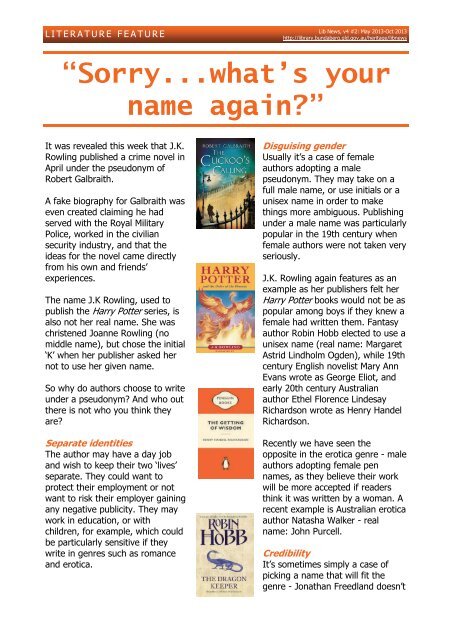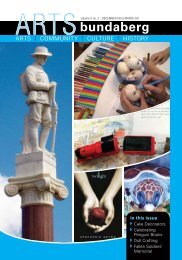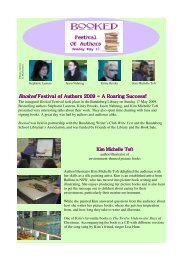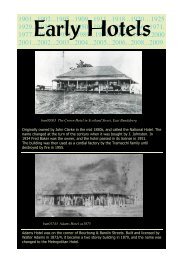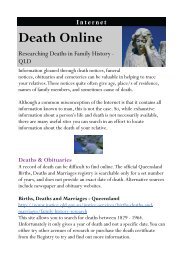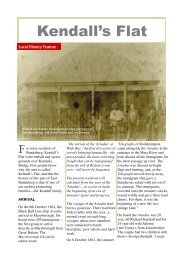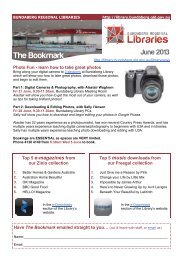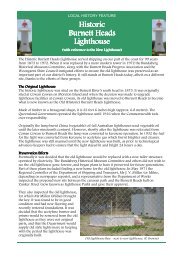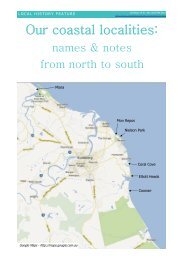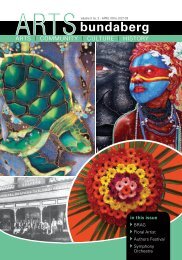Sorry...what's your name again? - Bundaberg Regional Libraries
Sorry...what's your name again? - Bundaberg Regional Libraries
Sorry...what's your name again? - Bundaberg Regional Libraries
You also want an ePaper? Increase the reach of your titles
YUMPU automatically turns print PDFs into web optimized ePapers that Google loves.
LITERATURE FEATURE<br />
Lib News, v4 #2: May 2013-Oct 2013<br />
http://library.bundaberg.qld.gov.au/heritage/libnews<br />
“<strong>Sorry</strong>...what’s <strong>your</strong><br />
<strong>name</strong> <strong>again</strong>?”<br />
It was revealed this week that J.K.<br />
Rowling published a crime novel in<br />
April under the pseudonym of<br />
Robert Galbraith.<br />
A fake biography for Galbraith was<br />
even created claiming he had<br />
served with the Royal Military<br />
Police, worked in the civilian<br />
security industry, and that the<br />
ideas for the novel came directly<br />
from his own and friends’<br />
experiences.<br />
The <strong>name</strong> J.K Rowling, used to<br />
publish the Harry Potter series, is<br />
also not her real <strong>name</strong>. She was<br />
christened Joanne Rowling (no<br />
middle <strong>name</strong>), but chose the initial<br />
‘K’ when her publisher asked her<br />
not to use her given <strong>name</strong>.<br />
So why do authors choose to write<br />
under a pseudonym? And who out<br />
there is not who you think they<br />
are?<br />
Separate identities<br />
The author may have a day job<br />
and wish to keep their two ‘lives’<br />
separate. They could want to<br />
protect their employment or not<br />
want to risk their employer gaining<br />
any negative publicity. They may<br />
work in education, or with<br />
children, for example, which could<br />
be particularly sensitive if they<br />
write in genres such as romance<br />
and erotica.<br />
Disguising gender<br />
Usually it’s a case of female<br />
authors adopting a male<br />
pseudonym. They may take on a<br />
full male <strong>name</strong>, or use initials or a<br />
unisex <strong>name</strong> in order to make<br />
things more ambiguous. Publishing<br />
under a male <strong>name</strong> was particularly<br />
popular in the 19th century when<br />
female authors were not taken very<br />
seriously.<br />
J.K. Rowling <strong>again</strong> features as an<br />
example as her publishers felt her<br />
Harry Potter books would not be as<br />
popular among boys if they knew a<br />
female had written them. Fantasy<br />
author Robin Hobb elected to use a<br />
unisex <strong>name</strong> (real <strong>name</strong>: Margaret<br />
Astrid Lindholm Ogden), while 19th<br />
century English novelist Mary Ann<br />
Evans wrote as George Eliot, and<br />
early 20th century Australian<br />
author Ethel Florence Lindesay<br />
Richardson wrote as Henry Handel<br />
Richardson.<br />
Recently we have seen the<br />
opposite in the erotica genre - male<br />
authors adopting female pen<br />
<strong>name</strong>s, as they believe their work<br />
will be more accepted if readers<br />
think it was written by a woman. A<br />
recent example is Australian erotica<br />
author Natasha Walker - real<br />
<strong>name</strong>: John Purcell.<br />
Credibility<br />
It’s sometimes simply a case of<br />
picking a <strong>name</strong> that will fit the<br />
genre - Jonathan Freedland doesn’t
LITERATURE FEATURE<br />
Lib News, v4 #2: May 2013-Oct 2013<br />
http://library.bundaberg.qld.gov.au/heritage/libnews<br />
sound like a thriller author, but<br />
Sam Bourne does.<br />
An author might think their <strong>name</strong><br />
sounds too young, or too old, for<br />
the type of book they’re writing.<br />
And a birth <strong>name</strong> which could be<br />
seen as odd might detract from a<br />
serious work. Or sur<strong>name</strong>s might<br />
lend themselves to double<br />
entendres in a particular genre.<br />
Teamwork<br />
Some books are written by a duo,<br />
or team of writers. To make it<br />
easier for all involved, one <strong>name</strong> is<br />
chosen to represent the team.<br />
Early examples include Franklin W.<br />
Dixon - several writers over time<br />
penning the Hardy Boys books,<br />
Carolyn Keene - a group of writers<br />
writing the Nancy Drew mysteries,<br />
and Ellery Queen - actually cousins<br />
Frederic Dannay and Manfred Lee.<br />
A current example is Nicci French<br />
(husband and wife team Nicci<br />
Gerard and Sean French).<br />
Prolific output<br />
Authors who just can’t stop writing<br />
may choose to publish under<br />
different <strong>name</strong>s so their readers<br />
don’t think they’re just churning<br />
out formulaic drivel, or so their<br />
writing doesn’t become<br />
overexposed. For example,<br />
Stephen King published several<br />
books as Richard Bachman<br />
because his publishers didn’t feel<br />
the public would buy more than<br />
one book a year by King.<br />
Diversity of genres<br />
If an author wishes to branch out<br />
into a new genre, especially if<br />
they’ve become well-known for<br />
writing something else, they may<br />
choose to publish these new stories<br />
under a different <strong>name</strong>. It could be<br />
a matter of not risking their<br />
reputation (in case the new book<br />
flops), or it may be that they don’t<br />
wish to upset or disappoint their<br />
readers - loyal Stephen King horror<br />
fans may be a bit put out to pick<br />
up his next novel and find it’s a<br />
soppy romance.<br />
Shelf space<br />
Some authors pick pseudonyms<br />
based on where upon the<br />
bookstore shelves their books will<br />
be placed. A sur<strong>name</strong> beginning<br />
with ‘A’ might not always be the<br />
best bet - you might be too high on<br />
the shelf for people to reach. Same<br />
for ‘Z’ - too low and people won’t<br />
bend down. Tania Carver’s (real<br />
<strong>name</strong>: Martyn Waites) editor<br />
wanted a sur<strong>name</strong> beginning with<br />
‘C’ - apparently shopper’s eyes are<br />
drawn to the top of the second<br />
bookshelf (usually the ‘C’s).<br />
Helpfully, the <strong>name</strong> Carver also<br />
suited the crime/thriller genre in<br />
which the books are published.<br />
Regency romance author Julia<br />
Quinn was born Julie Cotler<br />
(married <strong>name</strong>: Pottinger). She<br />
reportedly chose ‘Quinn’ so it would<br />
place her books on the shelf near<br />
those of successful romance author<br />
Amanda Quick.<br />
Sales & Reviews<br />
Obviously the <strong>name</strong> on the front<br />
cover can have a significant effect<br />
on both reviews and sales.<br />
When J.K. Rowling published The<br />
Casual Vacancy, her first book post<br />
Harry Potter, the critics were<br />
waiting with knives poised. The<br />
Cuckoo’s Calling, published under
LITERATURE FEATURE<br />
Lib News, v4 #2: May 2013-Oct 2013<br />
http://library.bundaberg.qld.gov.au/heritage/libnews<br />
the pseudonym Robert Galbraith,<br />
attracted very good, and probably<br />
fairer, reviews, because no-one<br />
knew it was actually by J.K.<br />
Rowling. E.L. James, author of the<br />
Fifty Shades books, has stated that<br />
she will write her next book under<br />
a pseudonym. This is presumably<br />
to avoid critics out to flay her next<br />
work just because it’s different to<br />
Fifty Shades.<br />
Revealing an author’s secret<br />
however, can significantly boost<br />
sales, as has been seen with J.K.<br />
Rowling’s The Cuckoo’s Calling.<br />
Within hours of the news being<br />
revealed the book shot straight to<br />
#1 on Amazon.<br />
Cynics may say these sorts of<br />
reveals are done deliberately in<br />
order to publicise the book and<br />
boost sales. And sometimes that<br />
may be the case. But the author is<br />
not the only one who knows the<br />
secret, and many people don’t<br />
always find secrets easy things to<br />
keep. And, just occasionally, ego<br />
may get the better of an author!<br />
See over page for a select list<br />
of author pseudonyms<br />
Peta Browne<br />
<strong>Bundaberg</strong> <strong>Regional</strong> <strong>Libraries</strong><br />
References:<br />
Gilbertson, Matt. “Australia’s queen of<br />
erotica - Natasha Walker, author of<br />
the Secret Life of Emma - is actually a<br />
man”, news.com.au, 1 Jun 2013.<br />
Accessed: 17 Jul 2013.<br />
Grossman, Lev. “Rewriting the<br />
Romance”, juliaquinn.com, Accessed:<br />
17 Jul 2013. [Originally published in<br />
TIME, 3 Feb 2003].<br />
Gupta, Prachi. “J.K. Rowling is mystery<br />
writer Robert Galbraith”, salon.com,<br />
14 Jul 2013. Accessed: 16 Jul 2013.<br />
J.K. Rowling official website,<br />
jkrowling.com, Accessed: 16 Jul 2013.<br />
Klasky, Mindy. “To Have and Have Not<br />
(A Pseudonym, That Is”,<br />
mindyklasky.com. Accessed 16 Jul<br />
2013. [Originally published in<br />
Romance Writers Report magazine,<br />
Sep 2011].<br />
Klems, Brian A. “Why do authors use<br />
pseudonyms?”, writersdigest.com, 29<br />
Apr 2008. Accessed: 16 Jul 2013.<br />
“List of pseudonyms”. Wikipedia.<br />
Accessed 17 Jul 2013.<br />
“Pen <strong>name</strong>”. Wikipedia. Accessed: 16<br />
Jul 2013.<br />
Santillano, Vicki. “Seven Famous<br />
Female Authors Who Used Male<br />
Psuedonyms”, divinecaroline.com.<br />
Accessed: 17 Jul 2013.<br />
Steger, Jason. “Is there any genre<br />
Rowling cannot master?”,<br />
smh.com.au, 15 Jul 2013. Accessed:<br />
16 Jul 2013.<br />
Youngs, Ian. “JK Rowling or Robert<br />
Galbraith: How to pick a pen <strong>name</strong>”,<br />
bbc.co.uk, 15 Jul 2013. Accessed: 16<br />
Jul 2013.<br />
Zaharoff, Howard G. “A Rose by Any<br />
Other Name: Pros and Cons of<br />
Pseudonyms”, mbbp.com. Accessed 16<br />
Jul 2013. [Originally published in<br />
Writer’s Digest, Jun 2003].
LITERATURE FEATURE<br />
Lib News, v4 #2: May 2013-Oct 2013<br />
http://library.bundaberg.qld.gov.au/heritage/libnews<br />
Famous as<br />
Stephen King<br />
J.K. Rowling<br />
E.L. James<br />
Ariana Franklin<br />
Nicci French<br />
Ellery Queen<br />
Henry Handel Richardson<br />
Tania Carver<br />
Sam Bourne<br />
Nora Roberts<br />
Robin Hobb<br />
Natasha Walker<br />
Ruth Rendell<br />
George Eliot<br />
Lemony Snicket<br />
Mark Twain<br />
Agatha Christie<br />
Rhys Bowen<br />
Robert Jordan<br />
Miles Franklin<br />
Emily Rodda<br />
Lewis Carroll<br />
Amanda Quick<br />
Ed McBain<br />
Dean Koontz<br />
Alexander Kent<br />
Cassandra Clare<br />
Elizabeth Peters<br />
Ellis Peters<br />
George Orwell<br />
Julia Quinn<br />
Also published as | Birth <strong>name</strong> | Other <strong>name</strong>/s<br />
Richard Bachman<br />
Robert Galbraith<br />
Erika Leonard<br />
Diana Norman<br />
Nicci Gerard & Sean French<br />
Frederic Dannay & Manfred Lee<br />
Ethel Florence Lindesay Richardson<br />
Martyn Waites<br />
Jonathan Freedland<br />
J.D. Robb<br />
Margaret Astrid Lindholm Ogden, Megan Lindholm<br />
John Purcell<br />
Barbara Vine<br />
Mary Ann Evans<br />
Daniel Handler<br />
Samuel Langhorne Clemens<br />
Mary Westmacott<br />
Janet Quin-Harkin<br />
James Oliver Rigney Jr<br />
Stella Marie Sarah Miles Franklin<br />
Jennifer Rowe<br />
Charles Lutwidge Dodgson<br />
Jayne Ann Krentz, Jayne Castle<br />
Evan Hunter<br />
Aaron Wolfe, Deanna Dwyer, David Axton, etc<br />
Douglas Reeman<br />
Judith Rumelt<br />
Barbara Michaels<br />
Edith Pargeter<br />
Eric Arthur Blair<br />
Julie Cotler Pottinger<br />
For more pseudonyms see the websites listed in the References, and:<br />
a.k.a: also known as - http://www.trussel.com/books/aka.htm


